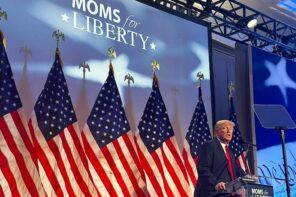In discussing Amy Sullivan’s piece on Rick Perry yesterday, I focused on David Lane, the behind-the-scenes yet powerful player in helping to promote chosen political candidates to evangelical voters. The role of the less visible players is far more crucial, in my view, than the big name honchos who Sullivan also reported are throwing their weight behind a possible Perry candidacy.
The three powerbrokers Sullivan mentioned—the religious right’s historian David Barton, Christians United for Israel founder John Hagee, and Family Research Council president Tony Perkins (updated below)—are all certainly people national reporters would watch to ferret out “what evangelicals think” about the GOP contenders. But what I found in covering the GOP primary in 2008 is that evangelical voters, especially the ones who take the time to go to the political dog and pony shows like the Values Voters Summit, really want to decide themselves; the big name endorsements don’t matter to them much.
Except, of course, when the big name endorsements don’t come for their chosen candidate; that’s evidence of infidelity or worse. That was the cause of The Big Rift of 2007-08, when Huckabee supporters were (and possibly still are) bitter that leaders didn’t get behind their guy until it was too late. “Who is James Dobson going to endorse?” was the never-ending query around the proverbial pundit water cooler. He endorsed Huckabee—finally, at the eleventh hour, when it was far too late. Huckabee wrote of his own resentment about the leadership’s refusal to get behind him in his 2008 book, Do the Right Thing, while praising “prophetic voices who broke with the old guard, determined to follow their convictions instead of the conventional wisdom of ‘who was going to win.'” (Some of those “prophetic voices” included Barton and American Family Association founder Don Wildmon, who is listed as part of the “leadership” of Perry’s prayer August prayer meeting; one person singled out for Huckabee’s ire was Hagee, who hosted Huckabee for a sermon at his church just days before Christmas 2007, but then endorsed John McCain.)
Huckabee had a problem: while he was beloved by many evangelicals who believed he didn’t speak to them but rather from them, he was reviled by the corporate class. And the religious right leaders took their cues from those criticisms, and in many cases refused to give Huckabee the nod. I’ve suggested that Michele Bachmann may very well receive a similar treatment—she’s a “fine Christian gal,” but I have serious doubts that the GOP will nominate a woman at the top of the ticket. Perry, on the other hand, is emerging as a favorite of the Tea Party, demonstrating his appeal to both the Christian right and its associated tax-slashing zealots.
At first blush, history, if not God, appears to be on Perry’s side: Texas, after all, has been the place where GOP presidents are made by the religious right. In 1979, as Huckabee recounts in his book, his then-boss James Robison organized a meeting of the emerging leaders of the religious right at a Dallas “Freedom Rally,” where, according to Huckabee, Robison realized the political power of conservative Christians and “would later be a part of a small circle of conservative evangelical leaders who would meet with Ronald Reagan and find him a man of principle and a patriot.” Religious right leaders helped organize a second meeting in 1980, after Reagan clinched the GOP nomination, the “National Affairs Briefing” (again, in Dallas) at which Reagan famously said, “I know you can’t endorse me. But I want you to know that I endorse you.” (Candidate Barack Obama deployed the same line when trying to court conservative evangelicals in Chicago in 2008, evidence that Democrats still don’t have their own blueprint for religious outreach.)
In 2000, Texas once again served as the anointing spot for a GOP president. In his hagiographic The Faith of George W. Bush, Stephen Mansfield reports on a 1999 meeting between Bush, then (like Perry) Governor of Texas, Karl Rove, and Robison, after which Robison concluded that he “had just spoken to the future president of the United States, a man who would preserve freedom.” Robison then introduced Bush to other evangelical, charismatic, and Pentecostal leaders in a series of meetings, where pastors laid hands on him and concluded that “it was obvious that this man’s heart gravitates toward the things of the Lord.” Hagee, for his part, later wrote a book endorsing Bush over Al Gore, titled God’s Candidate for America.
Two of the three reported Perry supporters, Barton and Hagee, are fellow Texans and have long ties to him. Barton’s WallBuilders is based in Texas and he is a former vice-chair of the Texas Republican Party; Hagee has made political contributions to Perry and hosted him at his San Antonio church. Sullivan reports that the call in which the support was pledged to Perry took place in early June; that coincides exactly with the timing of Perry’s announcement of his prayerfest, The Response, an event not theologically dissimilar to Perkins’ FRC’s “Call2Fall” this past weekend, at which attendees at churches across the country pledged, “I will answer God’s call to fall on my knees in humility and seek His face in repentance so that He might forgive my sins and heal our land.” (This pledge is taken from 2 Chronicles 7:14, frequently used by the religious right to claim that prayers will “heal” America of its “sins,” which notably include supporting LGBT or abortion rights, but don’t address all manner of sins of finance and warfare.)
There are risks for powerbrokers endorsing a candidate so early in the process. He could stumble, they could stumble, voters might turn out to like someone else better, the ultimate winner might resent the lack of support. A lot has changed since 1980, certainly, and even since 2000; there a variety of celebrity figures in the evangelical world (and Perry appears to be assembling as many of them as he possibly can). And, possibly more critically, there are more religious right candidates, which is the very result the movement has sought to produce for nearly 40 years, but makes it less likely that the movement would coalesce immediately around one. Frequently for the evangelical rank and file, their biggest heroes are their own hometown preachers or the candidate they choose themselves. Or the candidate they believe God reveals to them. Perry is angling to be the anointed one, but the evangelical evaluation process is far from over.
UPDATE: Perkins says he wasn’t on the call.




